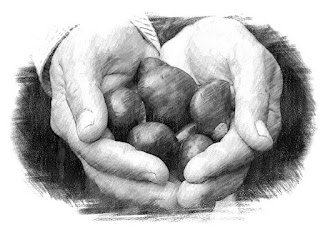I hear the rooster crowing as I lean out through the double shutters of the first-floor window. It is grey and misty, but at roof-top level, I can make-out the church spire to my right, closely clustered roof-tops to the left and the semi-wild, walled garden below.
 My son, barefoot and dressed in a hastily pulled on pair of shorts and pyjama top, runs through the damp grass towards the swing. At regular, gentle intervals his feet appear before vanishing into the foliage.
My son, barefoot and dressed in a hastily pulled on pair of shorts and pyjama top, runs through the damp grass towards the swing. At regular, gentle intervals his feet appear before vanishing into the foliage. What is the rooster playing at? It is nine o'clock in the morning, with dawn long gone. I push on the shutters to open them wider and crawl back into bed, accompanied by his continued, groggy calls for me to rise. The côt, côt of a chicken joins his long, single-noted last attempt. We all know that it has been a failed attempt.
What is the rooster playing at? It is nine o'clock in the morning, with dawn long gone. I push on the shutters to open them wider and crawl back into bed, accompanied by his continued, groggy calls for me to rise. The côt, côt of a chicken joins his long, single-noted last attempt. We all know that it has been a failed attempt.From beneath my crumpled blue doona I survey the room. The wind, rustling the leaves on the tree, draws my attention back outside. I feel young again, energised by the thought that I could be facing the magical branches of THE Faraway Tree and long to be able to disappear into their embrace. The drone of a distant airplane makes me twitch, as submerged childhood memories resurface and I see myself standing waiting, in a deserted schoolyard, with night falling, for my father to draw himself away from his books, and remember that he is supposed to be picking me up.
 The room is perfect. Not in the clean-lined, not-a-thing-out-of-place, bold new furniture way of trendy magazines. Perfect in the orderly jumble of lovingly collected furniture and home- and hand-painted artworks. Perched on top of a rough-at-the-edges armoire, a mermaid looks across at a decent-sized paper parasol, shielding a figure, humble in her papier mâché body and black straw hat. She is lying on her side, propped up on one elbow and completely absorbed in her book.
The room is perfect. Not in the clean-lined, not-a-thing-out-of-place, bold new furniture way of trendy magazines. Perfect in the orderly jumble of lovingly collected furniture and home- and hand-painted artworks. Perched on top of a rough-at-the-edges armoire, a mermaid looks across at a decent-sized paper parasol, shielding a figure, humble in her papier mâché body and black straw hat. She is lying on her side, propped up on one elbow and completely absorbed in her book.
The floor is made of skinny slats of polished wood and there is enough space for two roof lamps to be hanging. Walking produces the occasional, unfamiliar, but not uncomfortable, creak. The double curtains covering the second, unopened window permit the introduction of a diffused light.

Dishes clink and I hear the repeated squeak of compressed springs.
There is a dishwasher to be un-packed and jumping on the trampoline will not stave off my son's hunger for long.
I swing my legs to the floor.
Poor rooster.
Valiant, but out-matched.






















